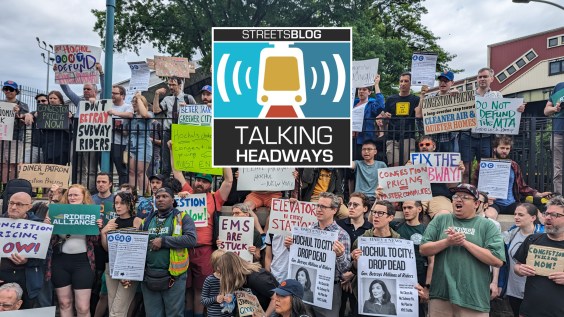Today on the Streetsblog Network, Bike Portland looks at a new review of the scientific literature
on the relation between bicycle infrastructure and injuries to
cyclists, conducted by researchers at the University of British
Columbia. While the study points to the need for more data, it finds
that dedicated bicycle infrastructure is associated with a lower risk
of injury for people on bikes.
Elly Blue writes:
Multi-use paths like the
Hawthorne Bridge have the
highest injury potential. Photo: Jonathan MausThere’s a constant chorus -- sometimes soft, sometimes overpoweringly
loud -- in every conversation about bike infrastructure in America. Its
refrain: You’re safer without any bike lanes, separated lanes, cycle
tracks, bike boulevards, off-road paths. Just take the lane, follow the
rules, wear your helmet, and you’ll be fine.A group of scholars at the University of British Columbia have found otherwise. They conducted a literature review,
looking at all available studies linking bicycle safety with
infrastructure. Their conclusions will be counterintuitive for some.“Results to date suggest that sidewalks and multi-use
trails pose the highest risk, major roads are more hazardous than minor
roads, and the presence of bicycle facilities (e.g. on-road bike
routes, on-road marked bike lanes, and off-road bike paths) was
associated with the lowest risk.”“One of the major advantages of infrastructure-based improvements,
compared to personal protective devices such as helmets, is that safe
infrastructure provides population-wide protection for all cyclists,”
study co-author Meghan Winters said in a press release.
The study's abstract draws these conclusions:
Evidence is beginning to accumulate that purpose-builtbicycle-specific facilities reduce crashes and injuries among cyclists,providing the basis for initial transportation engineering guidelinesfor cyclist safety. Street lighting, paved surfaces, and low-angledgrades are additional factors that appear to improve cyclist safety.Future research examining a greater variety of infrastructure wouldallow development of more detailed guidelines.
I'm sure that many of our network members will want to dig deeper into this one.
More from around the network: a rant against bike chic from Biker Chicks of West Chester. Extraordinary Observations makes the connection between free burritos and traffic congestion. And the Bicycle Coalition of Greater Philadelphia reports on biking the transit strike in that city.





